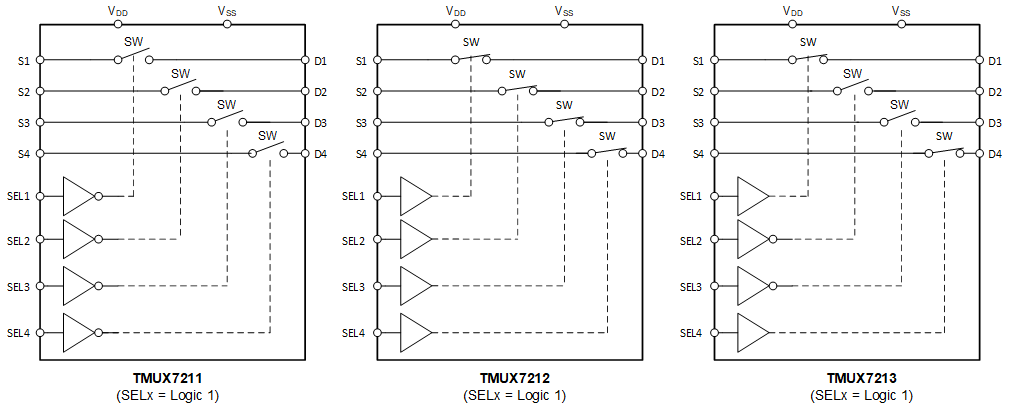SCDS416C October 2020 – August 2021 TMUX7211 , TMUX7212 , TMUX7213
PRODUCTION DATA
- 1 Features
- 2 Applications
- 3 Description
- 4 Revision History
- 5 Device Comparison Table
- 6 Pin Configuration and Functions
-
7 Specifications
- 7.1 Absolute Maximum Ratings
- 7.2 ESD Ratings
- 7.3 Recommended Operating Conditions
- 7.4 Thermal Information
- 7.5 Source or Drain Continuous Current
- 7.6 ±15 V Dual Supply: Electrical Characteristics
- 7.7 ±15 V Dual Supply: Switching Characteristics
- 7.8 ±20 V Dual Supply: Electrical Characteristics
- 7.9 ±20 V Dual Supply: Switching Characteristics
- 7.10 44 V Single Supply: Electrical Characteristics
- 7.11 44 V Single Supply: Switching Characteristics
- 7.12 12 V Single Supply: Electrical Characteristics
- 7.13 12 V Single Supply: Switching Characteristics
- 7.14 Typical Characteristics
- 8 Parameter Measurement Information
- 9 Detailed Description
- 10Application and Implementation
- 11Power Supply Recommendations
- 12Layout
- 13Device and Documentation Support
- 14Mechanical, Packaging, and Orderable Information
Package Options
Mechanical Data (Package|Pins)
Thermal pad, mechanical data (Package|Pins)
- RUM|16
Orderable Information
3 Description
The TMUX7211, TMUX7212, and TMUX7213 are complementary metal-oxide semiconductor (CMOS) switches with four independently selectable 1:1, single-pole, single-throw (SPST) switch channels. The devices work with a single supply (4.5 V to 44 V), dual supplies (±4.5 V to ±22 V), or asymmetric supplies (such as VDD = 12 V, VSS = –5 V). The TMUX721x supports bidirectional analog and digital signals on the source (Sx) and drain (Dx) pins ranging from VSS to VDD.
The switches of the TMUX721x are controlled with appropriate logic control inputs on the SELx pins. The TMUX721x are part of the precision switches and multiplexers family of devices and have very low on and off leakage currents allowing them to be used in high precision measurement applications.
The TMUX721x family provides latch-up immunity, preventing undesirable high current events between parasitic structures within the device typically caused by overvoltage events. A latch-up condition typically continues until the power supply rails are turned off and can lead to device failure. The latch-up immunity feature allows the TMUX721x family of switches and multiplexers to be used in harsh environments.
| PART NUMBER | PACKAGE | BODY SIZE (NOM) |
|---|---|---|
| TMUX7211 TMUX7212 TMUX7213 |
TSSOP (16) (PW) | 5.00 mm × 4.40 mm |
| WQFN (16) (RUM) | 4.00 mm × 4.00 mm |
 TMUX721x Block Diagrams
TMUX721x Block Diagrams